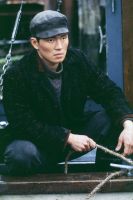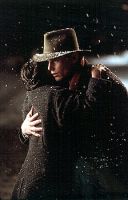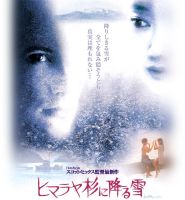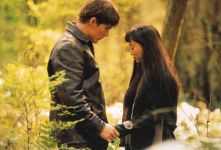Tracklist:
- Lost in the Fog (2:59)
- Carl's Fishing Net (2:52)
- Moran Finds the Boat (1:12)
- Hatsue and Ishmael Kiss (1:42)
- Kendo (00:51)
- Driftwood Hideaway (01:49)
- The Strawberry Field (03:54)
- The Worst Kind of News (01:07)
- Seven Acres (01:53)
- The German Soldier (03:13)
- Snowstorm (01:53)
- Coast Guard Report (01:12)
- Typeset (01:39)
- The Evacuation (06:34)
- Courtroom Montage (01:34)
- Susan Marie Remembers (01:36)
- The Defense (01:46)
- Snow Drive (01:29)
- Typing (01:41)
- Tarawa (04:09)
- The Battery (00:46)
- Carl And Kazuo Negotiate (01:44)
- Humanity Goes On Trial (04:47)
- New Evidence (01:23)
- Snow Angels (02:30)
- Can I Hold You Now? (04:47)
- End Titles (06:14)
|
1999 was an outstanding and a very productive year for James Newton Howard. He had just finished the well-established score for M.Night Shyamalan’s The Sixth Sense which granted him the assignment to what followed as another big success for him, Dinosaur. He also wrote the music to Mumford, Runaway Bride and a couple of other features that year, including the drama Snow Falling on Cedars.
 It was the 8th film by director Scott Hicks (who presented the excellent Shine and Hearts in Atlantis before and after Snow Falling on Cedars, respectively). Ethan Hawke, James Cromwell and Max von Sydow starred in the film which dealt with the story of Kazuo, a Japanese fisherman in the waters off Washington state who is being held suspect for the murder of Carl, another fisherman in the same area after he was found dead with a serious head injury. It was the 8th film by director Scott Hicks (who presented the excellent Shine and Hearts in Atlantis before and after Snow Falling on Cedars, respectively). Ethan Hawke, James Cromwell and Max von Sydow starred in the film which dealt with the story of Kazuo, a Japanese fisherman in the waters off Washington state who is being held suspect for the murder of Carl, another fisherman in the same area after he was found dead with a serious head injury.
 Post-war anti-Japanese sentiments are still running high, and the local community considers Kazuo to be the murderer. Ishmael, the small town's newspaperman, may have the information that would exonerate Kazuo, but can he ever put his jilted love for Kazuo's wife, Hatsue aside? Post-war anti-Japanese sentiments are still running high, and the local community considers Kazuo to be the murderer. Ishmael, the small town's newspaperman, may have the information that would exonerate Kazuo, but can he ever put his jilted love for Kazuo's wife, Hatsue aside?
The James Newton Howard score is mostly orchestral at its foundations, i.e. the strings section mostly and less of the brass one. Notable is the additional use of Japanese Ethnic instruments, like the Shakuhachi with ethnic flutes and the usage of solo violin. In a similar vein to his score for The Sixth Sense and his latest outing The Village, the music for Snow Falling on Cedars is very atmospheric, moody and textural.
James Newton Howard expresses himself and suits the movie with a wonderful main theme which is based on the interweaving of the strings and a large choir which admittedly produces a grand, raw and majestic, emotionally powerful result.
 After a long, introductory piece (‘Lost in the fog’ which basically uses dark electronics and manages to instantly bring images of foggy landscapes in the listener’s mind, without even knowing the piece’s title before listening for the first time) the main theme makes its first, brief appearance in ‘Carl’s Fishing net’ and restates with various renditions and variations - that include the addition of the piano and solo violin - throughout the whole score in several pieces, like ‘Moran finds the boat’, ‘Typeset’ and ‘End Titles’. An element that usually escorts this very main theme, are the solo violin and cello arpeggios, largely coloured and attributed in the Philip Glass type of arpeggios, just like they are being used again by Howard, later on in his score for The Village. After a long, introductory piece (‘Lost in the fog’ which basically uses dark electronics and manages to instantly bring images of foggy landscapes in the listener’s mind, without even knowing the piece’s title before listening for the first time) the main theme makes its first, brief appearance in ‘Carl’s Fishing net’ and restates with various renditions and variations - that include the addition of the piano and solo violin - throughout the whole score in several pieces, like ‘Moran finds the boat’, ‘Typeset’ and ‘End Titles’. An element that usually escorts this very main theme, are the solo violin and cello arpeggios, largely coloured and attributed in the Philip Glass type of arpeggios, just like they are being used again by Howard, later on in his score for The Village.
 James used another element that closely links The Village to Snow Falling on Cedars, that is the brilliant solo violin lines as heard In ‘The Strawberry Field’, ‘Snowstorm’, the heady ‘Humanity goes on trial’ with splendid choir work added, ‘Can I hold you now?’ and the ‘End Titles’, along with the main theme. In the score to The Village, the similar in timbre and style solo violin lines can be clearly heard in ‘Gravel Road’. James used another element that closely links The Village to Snow Falling on Cedars, that is the brilliant solo violin lines as heard In ‘The Strawberry Field’, ‘Snowstorm’, the heady ‘Humanity goes on trial’ with splendid choir work added, ‘Can I hold you now?’ and the ‘End Titles’, along with the main theme. In the score to The Village, the similar in timbre and style solo violin lines can be clearly heard in ‘Gravel Road’.
Three pieces that can be easily characterised as highlights of the album are ‘The evacuation’ and ‘Tarawa’ that feature fascinating choir lines with the accompaniment of strings and rhythmic percussion, grand and pompous, similar in style with Elliot Goldenthal’s choir work, specifically used in Final Fantasy among others; altogether with the last piece, ‘End Titles’ with the brilliant solo violin lines and the restates of the memorable main theme.
 Overall, Snow Falling on Cedars is a strange listening experience. It’s generally not-involving with sparse orchestration and thematic appearance, along with dark underscore until around track 20. This situation is not aided by the almost 70-minute duration of the score but the general mood and atmosphere changes solely in the afore-mentioned standout pieces, and especially towards the end of the score. It’s good, quiet music to use as a background listen while the listener’s attention is not frequently detached although its dark and moody nature can get a little depressing at times. In the movie, it is the perfect music accompaniment and on album a very good but subtle listening experience that shows, along with The Sixth Sense, Unbreakable, Signs and The Village, a more mature side of the composer, an aspect we haven’t been presented with before. Overall, Snow Falling on Cedars is a strange listening experience. It’s generally not-involving with sparse orchestration and thematic appearance, along with dark underscore until around track 20. This situation is not aided by the almost 70-minute duration of the score but the general mood and atmosphere changes solely in the afore-mentioned standout pieces, and especially towards the end of the score. It’s good, quiet music to use as a background listen while the listener’s attention is not frequently detached although its dark and moody nature can get a little depressing at times. In the movie, it is the perfect music accompaniment and on album a very good but subtle listening experience that shows, along with The Sixth Sense, Unbreakable, Signs and The Village, a more mature side of the composer, an aspect we haven’t been presented with before.
The Best: Explosive outbursts of raw power and emotional urge found in the excellent string and choir work.
The Worst: Tedious and repetitive dark underscore that dominates almost the half of the score. Works great in the film but poorly on album.
The Moments: Evacuation, Tarawa .
Demetris Christodoulides
|





